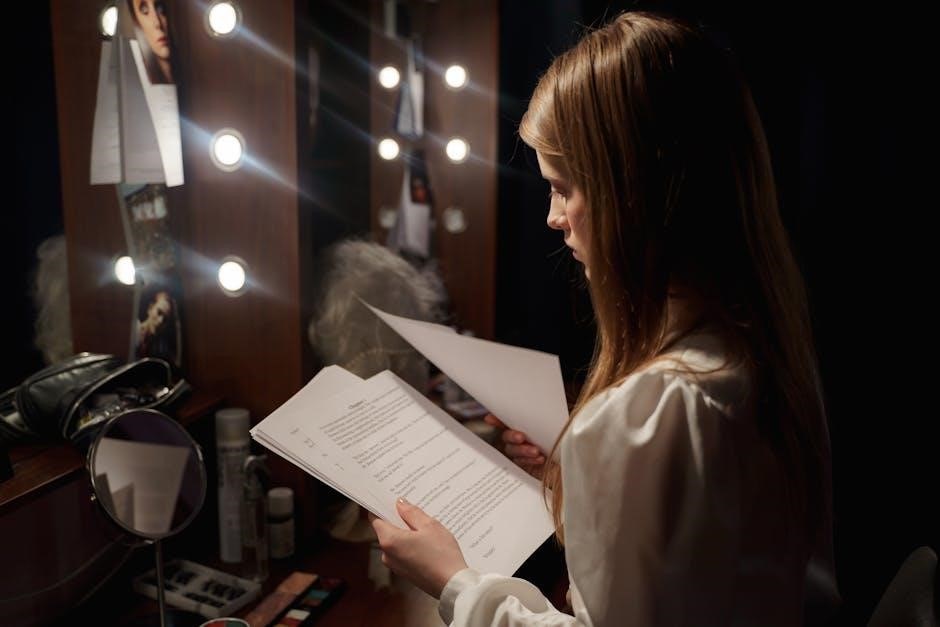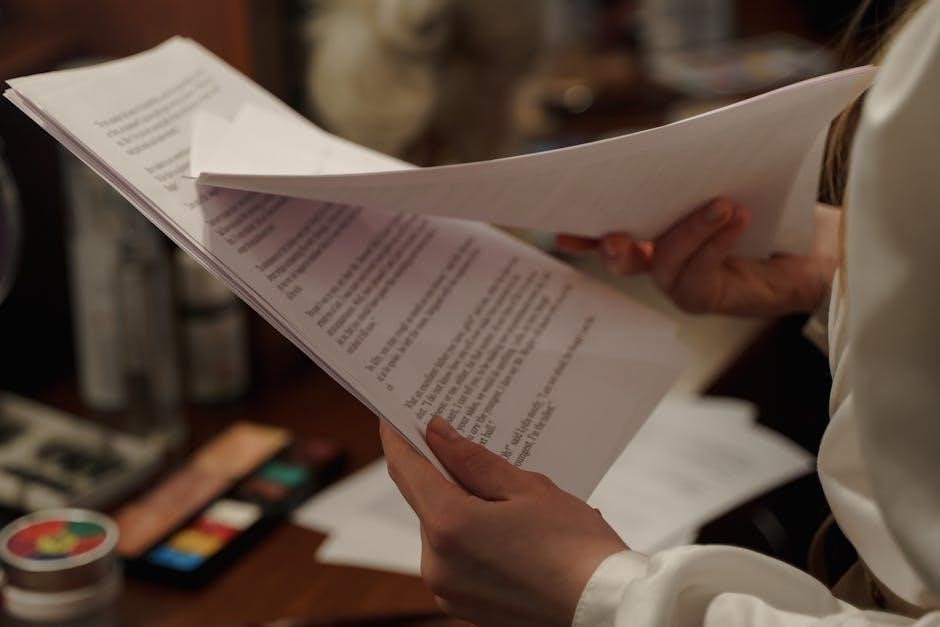Act III of Romeo and Juliet is pivotal‚ marked by tragic events‚ intense emotions‚ and critical decisions․ It explores themes of fate‚ loyalty‚ and conflict‚ setting the stage for the play’s devastating conclusion․ This act introduces key plot twists‚ including Mercutio’s death‚ Tybalt’s downfall‚ and Romeo’s banishment‚ while deepening Juliet’s internal struggle․ The study guide for Act III provides a detailed analysis of these elements‚ helping readers grasp the complexity of Shakespeare’s narrative․
1․1․ Summary of Act III
Act III of Romeo and Juliet is marked by tragic events that escalate the conflict and deepen the emotional turmoil․ The act begins with a fatal fight between Mercutio and Tybalt‚ where Mercutio is killed‚ prompting Romeo to avenge his friend by slaying Tybalt․ As a result‚ Romeo is banished from Verona‚ leaving Juliet in despair․ Juliet’s soliloquy reveals her anguish over Romeo’s fate and her determination to reunite with him․ Meanwhile‚ the Nurse delivers the devastating news of Romeo’s banishment to Juliet‚ intensifying her emotional struggle․ The act concludes with Romeo’s exile and Juliet’s desperate plan to defy her arranged marriage‚ setting the stage for the play’s tragic conclusion․
1․2․ Key Themes in Act III
Act III of Romeo and Juliet explores several key themes that drive the tragic narrative․ Fate and inevitability are central‚ as the characters’ choices and circumstances lead to irreversible consequences․ Impulsivity and rash decisions‚ such as Romeo’s revenge on Tybalt‚ highlight the destructive nature of unchecked emotions․ Loyalty and betrayal are also prominent‚ as seen in Romeo’s devotion to Mercutio and Juliet’s conflicting obligations to her family․ Additionally‚ the theme of love vs․ hate is intensified‚ as the feud between the Montagues and Capulets escalates․ These themes collectively underscore the play’s tragic momentum‚ emphasizing the fragility of life and the devastating impact of unresolved conflict․
1․3․ Historical Context of Act III
Act III of Romeo and Juliet is set against the backdrop of Verona’s feuding families‚ a scenario reflective of the societal tensions in Shakespeare’s time․ The play was written during the late 16th century‚ a period marked by familial loyalty and honor․ The historical context of the Elizabethan era influences the characters’ impulsive decisions and adherence to codes of conduct․ The Burbage family‚ prominent in theater‚ performed the play‚ linking it to the cultural landscape of the time․ This act mirrors the era’s emphasis on drama and tragic outcomes‚ making it a timeless reflection of human conflict and societal norms․

Scene-by-Scene Analysis

Act III unfolds with intense drama‚ beginning with Mercutio and Tybalt’s fatal duel‚ followed by Romeo’s banishment and Juliet’s emotional soliloquy‚ setting the stage for tragedy․
2․1․ Scene 1: The Fight Between Mercutio and Tybalt
Scene 1 of Act III opens in a public place‚ with Benvolio and Mercutio discussing the heat and potential conflict․ Tybalt arrives‚ seeking Romeo‚ and tensions rise․ Mercutio‚ provoked by Tybalt’s insults‚ draws his sword‚ despite Romeo’s attempts to intervene․ The fight ends tragically with Mercutio’s death‚ stabbed by Tybalt under Romeo’s arm․ Romeo‚ filled with grief and anger‚ kills Tybalt in revenge․ The scene highlights themes of impulsive behavior‚ loyalty‚ and fate‚ as these actions lead to Romeo’s banishment and escalate the tragic sequence of events․ This pivotal moment shapes the play’s outcome‚ showcasing the destructive power of hatred and revenge․
2․2․ Scene 2: Juliet’s Soliloquy and Preparation for Marriage
In Scene 2 of Act III‚ Juliet delivers a soliloquy filled with anxiety and anticipation as she prepares for her marriage to Romeo․ She worries about the risks of the potion and the potential consequences of her decision․ Juliet’s emotional turmoil reflects her growth from a naive girl to a determined woman willing to defy societal norms for love․ The soliloquy highlights her internal conflict between fear and devotion‚ showcasing her bravery and resolve․ This scene underscores Juliet’s transformation and sets the stage for the tragic events that will unfold‚ emphasizing her commitment to her love for Romeo despite the dangers․
2․3․ Scene 3: Romeo’s Banishment and Reaction
In Scene 3‚ Romeo faces the devastating news of his banishment from Verona after killing Tybalt․ Overcome with grief and despair‚ Romeo lashes out‚ feeling betrayed by fate and society․ He initially rejects Friar Laurence’s attempts to comfort him‚ declaring that death would be preferable to life without Juliet․ Romeo’s emotional turmoil is evident as he contemplates suicide‚ showcasing his impulsive and passionate nature․ Friar Laurence intervenes‚ urging patience and offering a plan to reunite Romeo with Juliet․ This scene highlights Romeo’s vulnerability and the consequences of his actions‚ while also emphasizing the friar’s role as a voice of reason in the escalating tragedy․
2․4․ Scene 4: The Nurse’s Role in Revealing Romeo’s Banishment
In Scene 4‚ the Nurse plays a pivotal role in delivering the heartbreaking news of Romeo’s banishment to Juliet․ The Nurse‚ deeply devoted to Juliet‚ struggles with the weight of the information‚ showing her loyalty and emotional connection to the young couple․ Her hesitation and grief in revealing Romeo’s fate highlight her maternal affection for Juliet․ The Nurse’s disclosure sparks Juliet’s despair and determination to defy her parents‚ further intensifying the conflict․ This scene underscores the Nurse’s importance as a confidante and her unintentional role in advancing the tragic events of the play․ Her actions reflect the complexity of her character and her ultimate loyalty to Juliet․

Study Guide Questions
- What role does fate play in Mercutio’s death?
- How does Juliet’s soliloquy reveal her inner conflict?
- What motivates the Nurse to reveal Romeo’s banishment?
- How does Romeo’s banishment affect the play’s tragic tone?
- What themes emerge from the clash between Tybalt and Mercutio?
3․1․ Questions About Plot Details
- Why does Romeo refuse to fight Tybalt‚ and what consequences follow?
- How does Mercutio’s death affect the plot and Romeo’s actions?
- What leads to Romeo’s banishment‚ and how does this impact Juliet?
- How does Juliet’s fake death plan unfold in Act III?
- What role does the Nurse play in revealing Romeo’s banishment?
- How does the fight between Mercutio and Tybalt escalate?
- What is the significance of Juliet’s soliloquy in preparation for marriage?
3․2; Questions About Character Development
- How does Romeo’s refusal to fight Tybalt in Act III reveal his character development?
- What does Mercutio’s death reveal about Romeo’s personality and actions?
- How does Juliet’s soliloquy in Act III reflect her emotional and psychological growth?
- In what ways does Tybalt’s character become more defined in this act?
- How does the Nurse’s loyalty and emotional response to Romeo’s banishment highlight her character?
- What does Friar Laurence’s advice reveal about his understanding of Romeo and Juliet’s situation?
- How does Juliet’s interaction with her parents in Act III show her changing relationship with them?
3․3․ Questions About Themes and Symbolism
- How does the theme of fate unfold in Act III‚ particularly through Romeo’s banishment?
- In what ways does the symbolism of darkness and light emphasize the tragic events of the act?
- How does the theme of loyalty manifest in Mercutio’s death and Romeo’s subsequent actions?
- What does the recurring motif of conflict reveal about the characters’ destinies?
- How does Juliet’s soliloquy symbolize her internal struggle between love and duty?
- What role does the theme of impulsive behavior play in the tragic outcomes of Act III?
- How does the setting of Verona symbolize the broader societal conflicts?
- What does the imagery of weapons and violence symbolize in this act?

Vocabulary and Key Terms
Explore critical vocabulary from Act III‚ such as banishment‚ soliloquy‚ duel‚ and tragic irony‚ to deepen your understanding of Shakespeare’s language and dramatic techniques in this pivotal act․
4;1․ Definitions of Important Words
In Act III of Romeo and Juliet‚ key terms like banishment (Romeo’s punishment)‚ soliloquy (Juliet’s private speech)‚ and duel (the fight between Mercutio and Tybalt) are crucial․ Tragic irony occurs when the audience knows more than the characters‚ heightening tension․ Fate and loyalty are central themes‚ driving the characters’ decisions․ Exile refers to Romeo’s removal from Verona‚ while recklessness describes Mercutio’s impulsive behavior․ Understanding these words enhances comprehension of Shakespeare’s dramatic techniques and the act’s emotional depth․
4․2․ Analysis of Dramatic Speeches
In Act III‚ dramatic speeches reveal deep emotional turmoil and thematic depth․ Juliet’s soliloquy in Scene 2 showcases her inner conflict‚ as she confronts her fears and loyalty to Romeo․ Her impassioned words‚ such as “O‚ I am fortune’s fool!” highlight her desperation․ Romeo’s speeches‚ particularly after his banishment‚ express his anguish and sense of betrayal․ Mercutio’s witty yet fiery dialogue in Scene 1 underscores his volatile nature․ These speeches not only advance the plot but also illuminate the characters’ motivations and the tragic inevitability of the story․ Shakespeare’s use of language masterfully conveys the intensity of their emotions‚ making Act III a pinnacle of dramatic expression․
Act III of Romeo and Juliet is a pivotal moment‚ intensifying the tragic conflict and setting the stage for the play’s inevitable conclusion․ Key events like Mercutio’s death‚ Romeo’s banishment‚ and Juliet’s emotional turmoil highlight the escalating consequences of their families’ feud․ This act underscores themes of fate‚ loyalty‚ and impulsive decisions‚ leaving a lasting impact on the narrative․ Studying Act III provides essential insights into Shakespeare’s mastery of dramatic tension and character development‚ preparing readers for the heart-wrenching finale․
5․1․ Summary of Key Takeaways
Act III of Romeo and Juliet is a turning point‚ marked by tragic events and emotional depth․ Mercutio’s death at Tybalt’s hand leads to Romeo’s impulsive revenge‚ resulting in his banishment․ Juliet’s soliloquy reveals her inner turmoil as she prepares for a secret marriage‚ while the Nurse’s loyalty is tested․ The act explores themes of fate‚ loyalty‚ and conflict‚ highlighting the devastating consequences of impulsive decisions․ The study guide emphasizes the importance of understanding these key moments‚ as they set the stage for the play’s heart-wrenching conclusion․ Analyzing these scenes provides insight into Shakespeare’s mastery of dramatic tension and character development․
5․2․ Tips for Further Study
To deepen your understanding of Act III‚ consider the following strategies:
– Re-read key scenes‚ such as Mercutio’s death and Juliet’s soliloquy‚ to analyze dramatic tension and character development․
– Use study guides or infographics to visualize plot progression and thematic connections․
– Watch video analyses or stage adaptations to observe how directors interpret pivotal moments․
– Explore dramatic speeches‚ like Romeo’s reaction to banishment‚ to understand Shakespeare’s use of language․
– Reflect on themes like fate‚ loyalty‚ and impulsive behavior‚ and how they resonate in modern contexts․
– Engage in discussions or write essays to articulate your insights and questions about the act’s significance․
This approach will enhance your comprehension and appreciation of Act III’s emotional and narrative depth․
